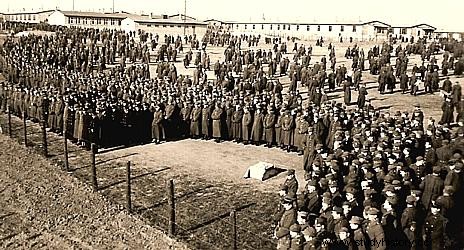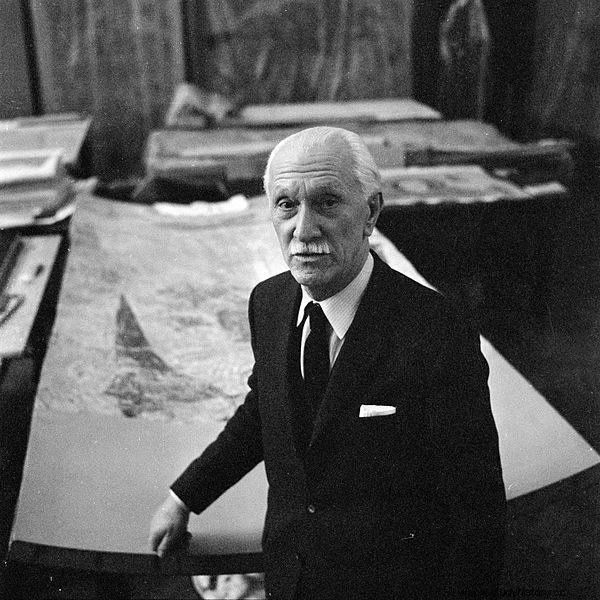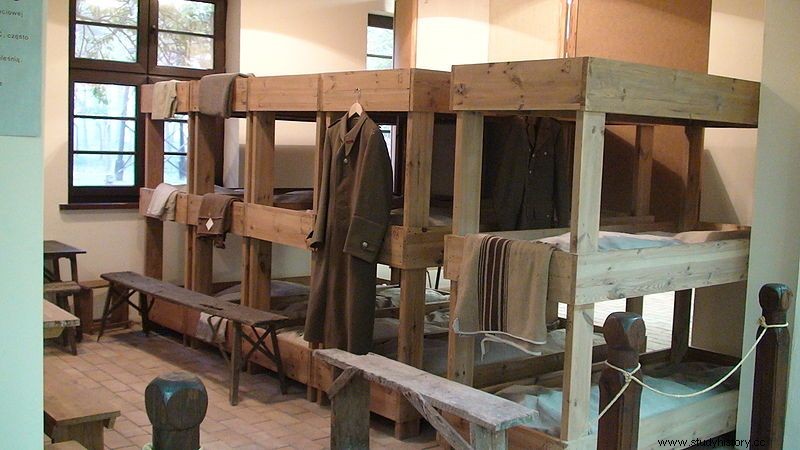When we hear the words "concentration camp", the association is only one "extermination camp", and thus millions of victims, crematoria, slave labor, etc. The title slogan must therefore be surprising. During the occupation, not a single high school or, obviously, higher school operated in Poland. All the more so, the camp can be associated with everything, but not with education.
The association is of course absolutely correct, it was hard to survive in the camp, let alone learn. All known camps have been recorded in our memory as extermination camps. There is, however, one exception, rather unknown to Polish society - Oflag II C - German POW camp for Polish officers in Woldenberg (Dobiegniew). Only in this camp officially operated a Polish university. Moreover, the German camp authorities knew about this activity.
Camp education?
In this case, the international conventions on allowing prisoners of war to participate in educational activities were respected. Of course, the idea of starting the university did not come from the camp administration. He was encountered by Polish captive reserve officers who were plainly teachers or university employees , mobilized before the outbreak of the war in September 1939, and students.

Appeal in the Oflag II C Woldenberg POW camp
Over 7,000 prisoners passed through the camp in Woldenberg. There were 800 teachers and several hundred students among them. Everyone decided to use the time of forced inactivity to get or complete their education. By a lucky coincidence, there were several dozen mobilized scientists in the camp. They willingly agreed to take such action.
The most numerous were doctors, associate professors and assistants. Among them were later famous scientists, such as:prof. Karol Górski historian, professor at the Nicolaus Copernicus University in Toruń, professor Kazimierz Michałowski - archaeologist from the University of Warsaw, and prof. Wiktor Steffen - classical philologist, professor at the University of Wrocław and Poznań. They became the main implementers of the idea of creating a university in the camp. At the end of its existence, the camp had approximately 1,500 students.
Of course, such a university did not formally exist, and students participated in self-study classes. Interestingly, in the camp, the POWs managed to collect a quite substantial library for the purposes of the university, consisting of several tens of thousands of volumes. The first copies came from officers who took the books on their way to the war. In the following period, the books were sent by the families of prisoners in food parcels.
The International Red Cross made a significant contribution to the completion of the library. They were usually textbooks in English, but this problem was also solved by organizing courses in this language. It was taken care of by Ralf Adamowski - a pre-war sea broker. There were also courses in other languages, including German. After some time, the Germans closed this course in order not to make it easier for prisoners to escape from the camps. Of course, there weren't enough books anyway, that's why some of the textbooks were rewritten by prisoners.

Prof. prof. Kazimierz Michałowski ran the archaeological section
The largest school during the Second World War
Although it seems improbable, studies were conducted in many fields. They were assigned to individual sections. The philological section included Polish, classical, Roman, German and Egyptology. Its tutor was doc. Dr. Wiktor Steffen. The historical section, which was then under the care of doctor Karol Górski, covered ancient history, medieval history, Polish history, auxiliary sciences of history and Latin palaeography. Archaeological section, headed by prof. Kazimierz Michałowski included prehistory and Egyptology. There were also sections:pedagogical, social education, commercial schools, economic and political, legal, agricultural and forestry, geographical, mathematical, architecture and polytechnic sciences.
It seems unbelievable, but on average there were about a hundred listeners in each section. The participants of the classes emphasized that the students took them extremely seriously, studying them diligently . The level of education was very high. Interestingly, even in these extraordinary conditions, the employees retained the rules of the university, because only those lecturers who had such powers before the war had the right to conduct examinations. It was also possible to obtain such consent from a professor who was not staying in the camp, it was given in writing by, for example, prof. Kazimierz Ajdukiewicz. The exams were passed before the commission which issued the appropriate certificate (examination card). Not only the subject and grade were noted on it, but also what textbooks the student used and what lectures he attended.

Few are aware that in the Oflag II C camp the prisoners completed their education
Particularly talented students received letters of recommendation to be used after the war when applying for the opportunity to study. From 1943, students even received indexes. In order not to reveal to the Germans the real nature of the classes, these were the ID cards of the Association of Students of Polish Academic Schools "Bratnia Pomoc". Each academic year began with a solemn inauguration with obligatory lecture. The first such lecture was about the song Bogurodzica. Some of the lectures were officially reported to the camp command and then they were delivered in the camp day rooms. Those on forbidden subjects were held in the barracks.
The Woldenberg University was a kind of unprecedented phenomenon. Thanks to the initiative of the officers-scientists, the POWs did not waste their forced inactivity while in the camp. About 1,600 people passed through this university, which seems to be an unbelievable number. Thanks to the efforts of the staff, many of them obtained formal education or completed it after the war.
Some of them had their first contact with a university. The illiterate, because they were also in the camp, learned to read and write. Even scientific papers and textbooks were written in the camp. There was not only a university, there were also various training courses, including educational, e.g. school administration, library, but also practical ones, such as welding, construction, electrical engineering, beekeeping, fish farming, and elite courses such as aviation, automotive , sculptural or painting. As stated in the book on this subject, prof. Tadeusz Batóg, it can be said that the POW camp in Woldenberg was one big school, the largest Polish school operating during the Second World War.
